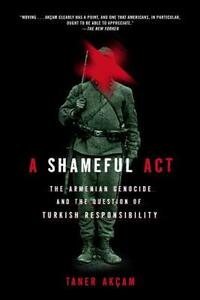Take a photo of a barcode or cover
5 reviews for:
A Shameful Act: The Armenian Genocide and the Question of Turkish Responsibility
Taner Akçam
5 reviews for:
A Shameful Act: The Armenian Genocide and the Question of Turkish Responsibility
Taner Akçam
informative
slow-paced
"The Turkish killing of the Armenians is not simply persecution of the Christians. On the contrary, it is part of the life-and-death struggle of an old and great empire not willing to die without exerting one last, bloody effort to save itself." In such an environment, it was easy to spread the idea that the Armenians were simply an internal extension of external enemies. More and more, the Armenian question came to be seen as a question of the empire's very survival. Solidarity among the empire's Muslims, no matter what, was the psychological product of decline and disintegration coupled with the belief of being surrounded by hostile forces desiring the state's elimination.
If it is not possible to draw a clear line of division between humanitarian goals, on the one hand, and a state's economic and political interests, on the other, then how are we to come to a consensus about ethical norms? And on what legal and theoretical grounds shall we justify international interventions? These questions remain unanswered.
Akçam's book about the Armenian Genocide was a very informative, and at times, an infuriating read. I hadn't known that much about it before reading, other than that it took place during WWI and was the inspiration for Hitler to start the Holocaust. The parallels between this genocide and the Holocaust were very unnerving and eerie to read about, knowing what this event inspired. The way that the CUP government legalized the slaughtering of an entire people was reminiscent of the Nazis. But the Holocaust shouldn't be thought of as an overshadowing of the Armenian Genocide because the one thing that this book presses home about is the fact that the Armenian Genocide was forgotten; forgotten by the Turks, by the West, and really by the whole world so it was doomed to repeat itself.
I was infuriated by the lack of response and lack of urgency of the Allied powers throughout this book as they always had an ulterior motive behind their supposed "humanitarian" motives. They wanted to first figure out, when they split up the Ottoman Empire after WWI, who's getting what part so they had to solve that first before they could even get to the punishing of war crimes (which they never got to). This doesn't even factor the whole issue of how do you punish war crimes while also respecting a nation's sovereignty which was another obstacle in the path of bringing to justice the perpetrators.
But the thing that pissed me off the most, was the denial of the genocide by various nationalist Turks at the time. Their constant arguing that the Armenians brought it on themselves by being prosperous and constantly talking to the West was insane to me because why would they be trying to get the help of the West if they didn't feel like the Ottoman Empire/Turkey was willing to work with them? With the rise of the nationalistic rhetoric especially, the Armenians felt increasingly more vulnerable to an attack by the Turks which is what happened so why would they work with them? But then the Turks had the audacity to say that it was deserved because the Armenians returned the attack after being slaughtered?! They initiated the massacres first and on a much larger scale than the Armenians did to the Turks, but I really appreciated that Akçam mentioned this, as the conflict was much more grey than I first thought (though decidedly more black on the Turkish side).
Overall, this book was a very informative and well-argued read that is very important to know the history of. This is literally the most prime example of the saying that if we don't study history, we are doomed to repeat it, and sadly events just like the Armenian Genocide have happened multiple times in the decades since. But if more people are aware of it and read books like Akçam's, maybe things might be different.
If it is not possible to draw a clear line of division between humanitarian goals, on the one hand, and a state's economic and political interests, on the other, then how are we to come to a consensus about ethical norms? And on what legal and theoretical grounds shall we justify international interventions? These questions remain unanswered.
Akçam's book about the Armenian Genocide was a very informative, and at times, an infuriating read. I hadn't known that much about it before reading, other than that it took place during WWI and was the inspiration for Hitler to start the Holocaust. The parallels between this genocide and the Holocaust were very unnerving and eerie to read about, knowing what this event inspired. The way that the CUP government legalized the slaughtering of an entire people was reminiscent of the Nazis. But the Holocaust shouldn't be thought of as an overshadowing of the Armenian Genocide because the one thing that this book presses home about is the fact that the Armenian Genocide was forgotten; forgotten by the Turks, by the West, and really by the whole world so it was doomed to repeat itself.
I was infuriated by the lack of response and lack of urgency of the Allied powers throughout this book as they always had an ulterior motive behind their supposed "humanitarian" motives. They wanted to first figure out, when they split up the Ottoman Empire after WWI, who's getting what part so they had to solve that first before they could even get to the punishing of war crimes (which they never got to). This doesn't even factor the whole issue of how do you punish war crimes while also respecting a nation's sovereignty which was another obstacle in the path of bringing to justice the perpetrators.
But the thing that pissed me off the most, was the denial of the genocide by various nationalist Turks at the time. Their constant arguing that the Armenians brought it on themselves by being prosperous and constantly talking to the West was insane to me because why would they be trying to get the help of the West if they didn't feel like the Ottoman Empire/Turkey was willing to work with them? With the rise of the nationalistic rhetoric especially, the Armenians felt increasingly more vulnerable to an attack by the Turks which is what happened so why would they work with them? But then the Turks had the audacity to say that it was deserved because the Armenians returned the attack after being slaughtered?! They initiated the massacres first and on a much larger scale than the Armenians did to the Turks, but I really appreciated that Akçam mentioned this, as the conflict was much more grey than I first thought (though decidedly more black on the Turkish side).
Overall, this book was a very informative and well-argued read that is very important to know the history of. This is literally the most prime example of the saying that if we don't study history, we are doomed to repeat it, and sadly events just like the Armenian Genocide have happened multiple times in the decades since. But if more people are aware of it and read books like Akçam's, maybe things might be different.
challenging
dark
informative
medium-paced
dark
emotional
informative
reflective
Graphic: Genocide
I did not know that a book like this on the Armenian Genocide written by a Turk existed so when I found it I knew I had to read it. I was completely blown away. I understand the complaint that I've read in other reviews that the author's almost obsessive need to document every detail about the lead up to and cover up of the Genocide was off putting. For me as a Master's in History student with a thesis topic of the Genocide this book proved immensely valuable. I am deeply indebted to the author's courage in writing such a thorough accusation of the CUP (Young Turks) and their role in the Armenian Genocide.

